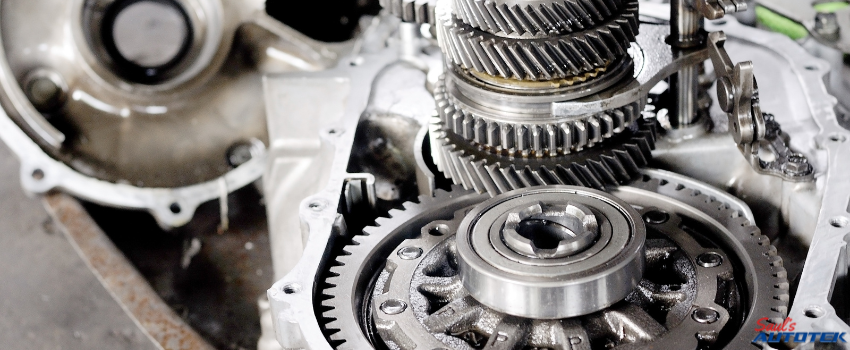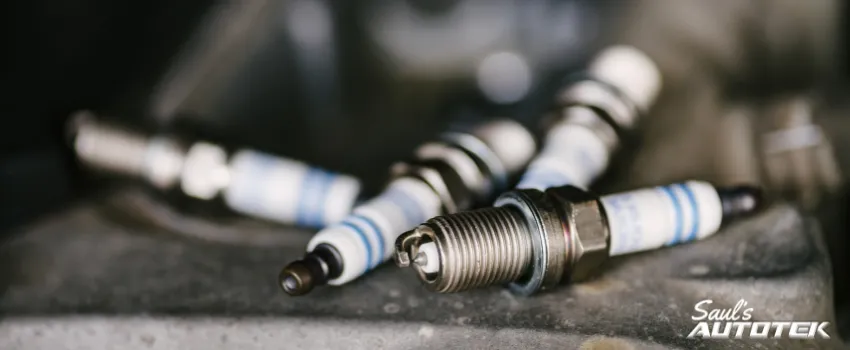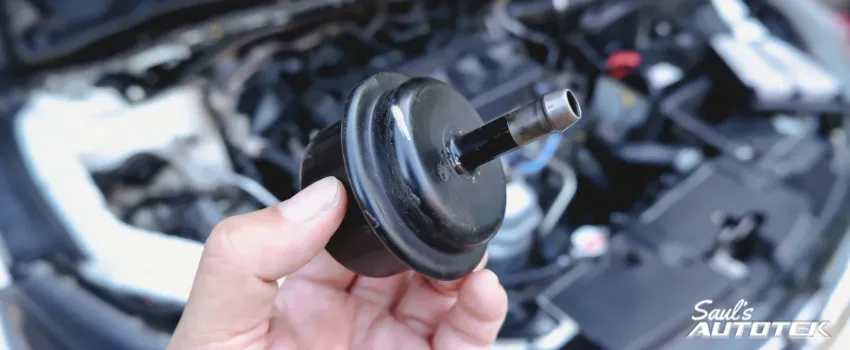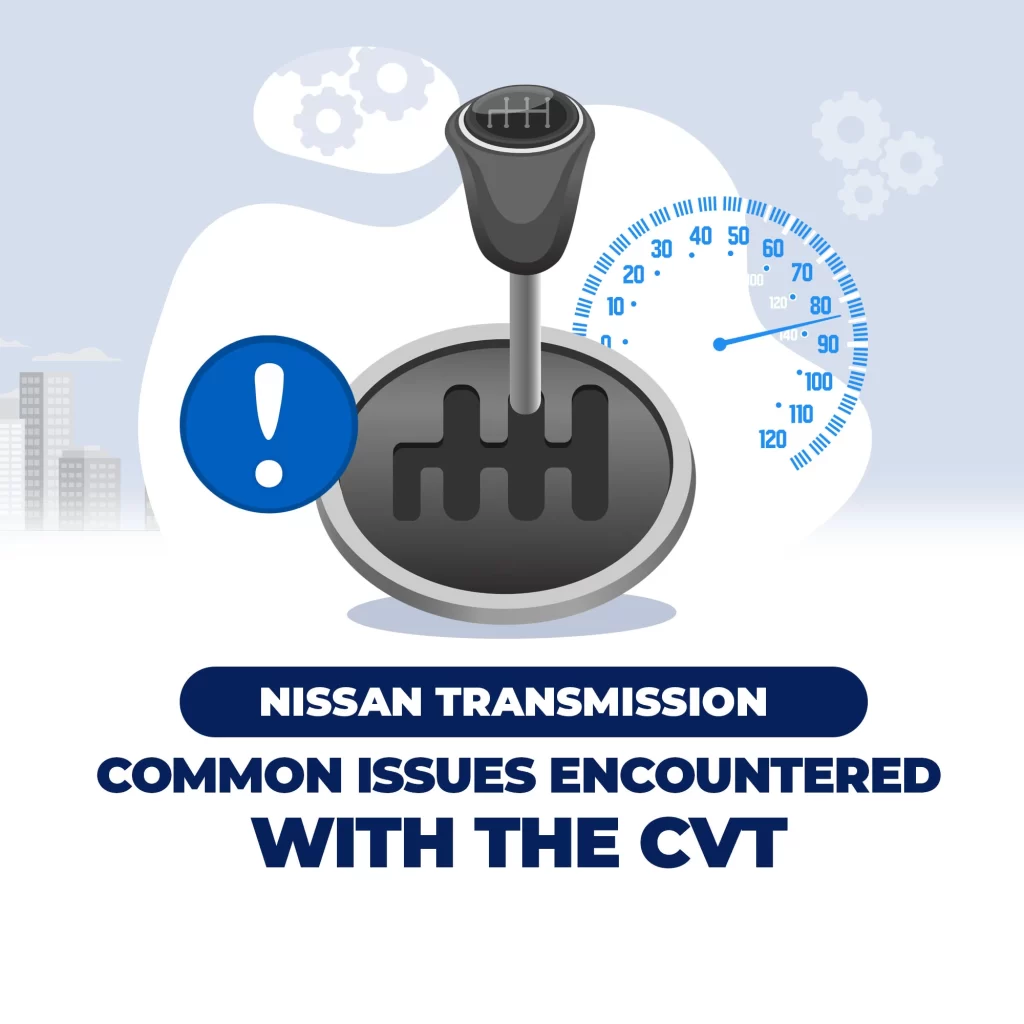
Continuously Variable Transmission (CVT) is a type of transmission used in many Nissan vehicles. While many consider CVT as an automatic because the driver does not have to shift gears, it’s actually different as it does not operate using traditional driving gears. As the name suggests, CVT is a belt-driven transmission with a constant or continuous gear ratios, which translates to efficiency and a smoother ride.
CVT has become a popular option for many people with most car manufacturers promoting their own versions of the transmission. Nissan, for instance, has put out several models that use CVT, including Altima, Maxima, Rogue Sport, Kicks, Murano, Pathfinder, and a lot more.
What kind of transmission is in Nissan? In a Nissan CVT transmission, the pulleys are connected to hydraulic pumps that control the movement of the transmission fluid. When the driver accelerates, the hydraulic pumps change the position of the pulleys to provide the optimal gear ratio for the vehicle’s speed and load. The transmission control module also takes into account factors like engine speed, throttle position, and vehicle movement to adjust the gear ratio as needed.
Nissan’s CVT also incorporates a torque converter, which helps the engine to maintain a smooth and consistent power output even when the vehicle is stationary. The torque converter employs a fluid coupling when it sends power to the transmission from the engine, providing a smooth transition between the two.
As one can imagine, this transmission type is a popular option for a good reason. Aside from a smoother ride, CVT benefits include improved fuel efficiency, better torque, and enhanced power responsiveness. Unfortunately, despite its ups, CVT also has its downs. Read on and find out more about common CVT issues.
How long do Nissan CVT transmissions last?
This can vary depending on several factors, such as driving habits, maintenance history, and environmental conditions. Generally, however, a well-maintained Nissan transmission can last up to 100,000 miles or more.
Nevertheless, it’s important to note that following the manufacturer’s recommended maintenance schedule is crucial, especially when it comes to transmission inspection. Additionally, driving conservatively, avoiding excessive speeds, and overloading can help prolong the life of the transmission.
What year did Nissan have transmission problems?
Nissan has had various transmission problems over the years with its various models. Some of those that have been known to experience transmission issues include the 2004-2009 Nissan Murano, the 2004-2006 Nissan Maxima, and the 2005-2007 Nissan Pathfinder.
Is the Nissan CVT transmission reliable?
It’s worth noting that Nissan addressed the problem quickly by extending warranties and even issued recalls in some cases. More importantly, the company has made improvements to its CVT technology over the years, and more recent models have generally been reported to have fewer problems. Nevertheless, if you’re considering purchasing a constantly variable transmission Nissan car, it’s a good idea to test drive it first, paying attention to how the transmission feels during acceleration and shifting.
What is the common problem of Nissan transmission?
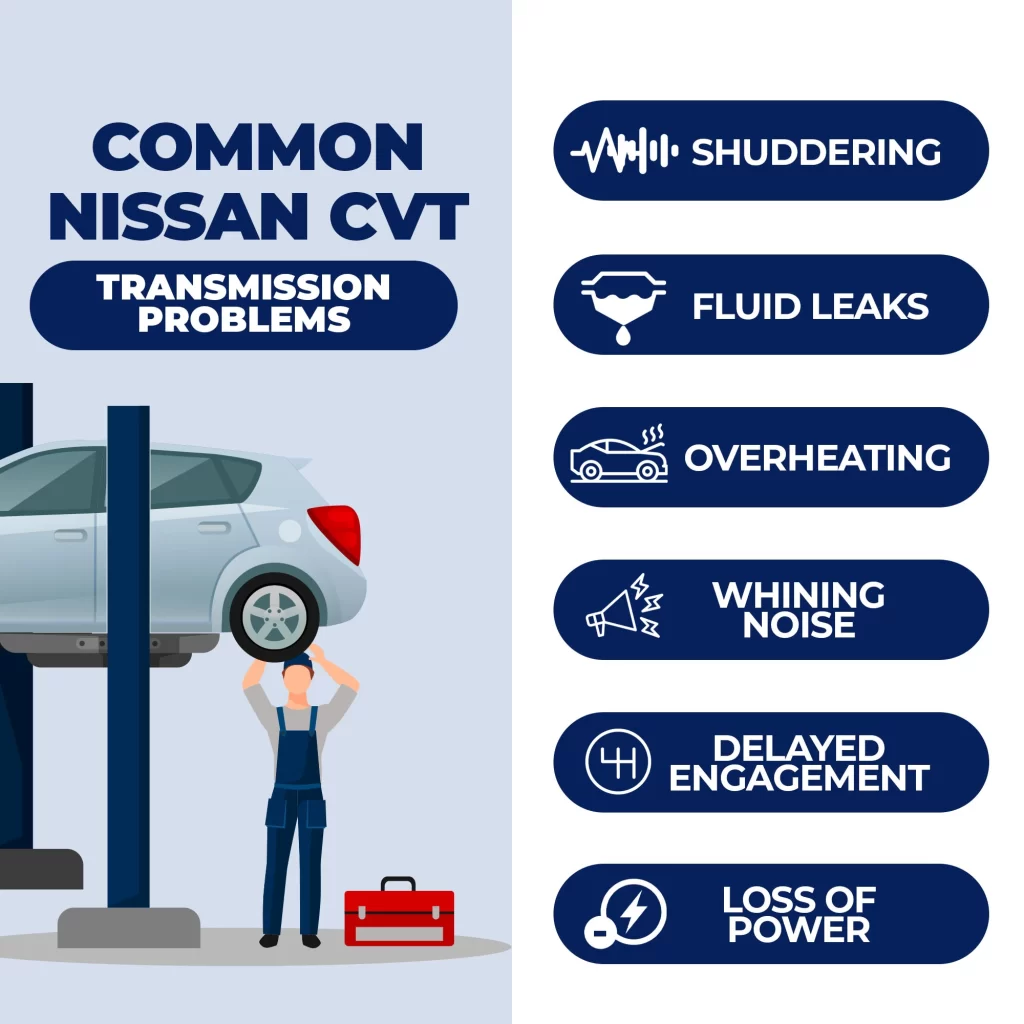
While Nissan’s CVT is designed to provide smooth and efficient performance, there have been some reported issues. Here are some of the most common Nissan CVT transmission problems you should watch out for:
1. Shuddering
Some Nissan owners have reported experiencing shuddering or strange car vibrations.
When this happens, it means that the car is experiencing an abnormal movement or jolt while in motion. This can be felt through the steering wheel, seats, pedals, or other parts of the car. The problem is most noticeable at low speeds or when starting from a stop.
2. Fluid Leaks
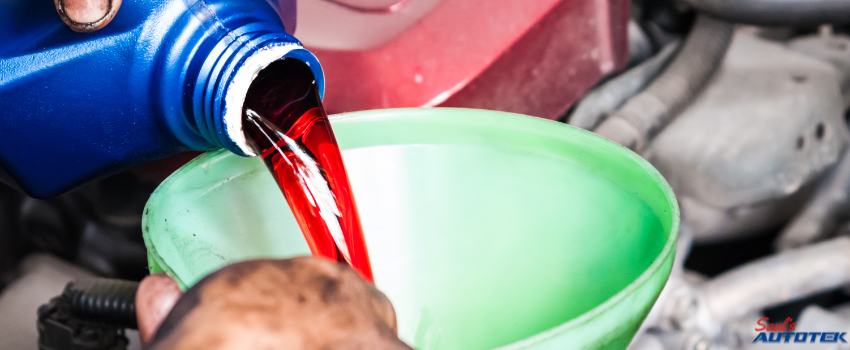
There have been known reports of Nissan’s CVT having transmission fluid leakage. Transmission fluid is a crucial component of the transmission system, as it lubricates the moving parts and helps to regulate temperature. If this leaks out, it can cause a variety of problems for the transmission, including overheating, slipping gears, and ultimately, damage to the entire system.
3. Overheating

In some cases, the CVT have been known to overheat. An overheated CVT can cause the transmission fluid inside it to break down, losing its ability to lubricate and cool the transmission components effectively. This can lead to accelerated wear and tear, damage to internal components, and ultimately transmission failure.
Moreover, the heat generated from an overheating CVT can cause seals and gaskets to degrade or even melt. This can lead to fluid leaks that can further damage the transmission system.
4. Whining Noise
This is another common Nissan transmission issue. Car owners reported that the whining noise is particularly heard when they are either accelerating or decelerating.
This could be an indication of a failing transmission, as the noise is typically caused by worn-out bearings or gears inside the system.
5. Delayed Engagement
Some Nissan CVT transmission systems are said to exhibit this when shifting from park to drive or reverse. This can make it difficult to drive the vehicle smoothly. Ideally, the transmission must engage the selected gear quickly to allow the car to move safely.
6. Loss of Power
Transmission failure can be particularly dangerous, especially for drivers who are trying to merge or pass on a major highway. Needless to say, this is among the Nissan transmission issues that can have serious consequences for car owners, especially when they are on the road.
The Nissan Response
Nissan has acknowledged that some of their vehicles equipped with CVT technology have experienced several issues. In response to these concerns, the company has extended the warranty on vehicle models equipped with CVTs. For example, the powertrain warranty on 2003-2010 Nissan cars has been extended to 10 years or 120,000 miles, whichever comes first. Additionally, Nissan has issued several technical service bulletins (TSBs) to dealerships to provide guidance on how to diagnose and repair Nissan transmission issues.
Nissan has also introduced several improvements to their CVT technology over the years. Among others, a torque converter in some models has been installed to improve low-speed acceleration and a shift programming feature has been updated to reduce engine noise and improve fuel economy.
Key Takeaway
Nissan’s CVT is designed to provide smooth, efficient performance and improved fuel economy compared to traditional automatic transmissions. However, like any transmission systems, the CVT requires regular maintenance to ensure reliable operation over the long term. Given this, It’s always a good idea to have your vehicle regularly serviced and to address any potential issues as soon as possible to prevent further damage.
If you are experiencing Nissan transmission problems, it is recommended that you take it to a trusted Nissan auto repair center for diagnosis and potential repair under warranty or recall. In this regard, it’s important to note that some transmission issues can be effectively addressed through proper maintenance and timely repairs.
Change gears with Saul’s Autotek for top-notch Nissan driving experience.

While there are lots of auto repair shops around, not all of them can service a Nissan. Saul’s Autotek, however, is different. Our advanced technology allows us to handle various car models, including popular brands like Nissan.
As the famous car manufacturer has reported transmission problems, we have formed a special Castle Rock transmission repair group. This will readily assist you if your Nissan is exhibiting issues. Rest assured that these will be resolved to your satisfaction. Call us now.


